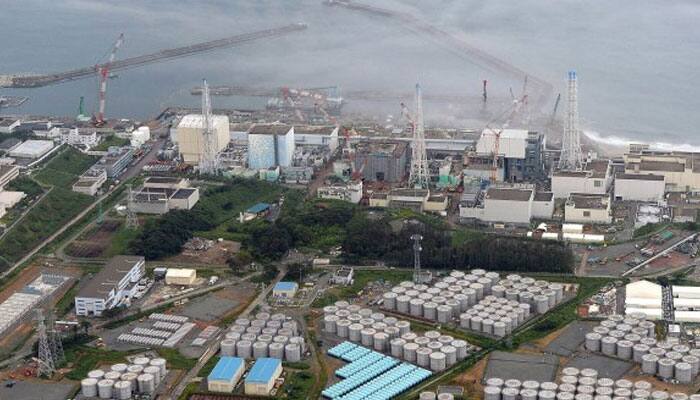Pallava Bagla
Fukushima: Traumatised locals in Fukushima still spend sleepless nights even as Japan re-started last month one of its fifty nuclear plants that have been shut down after the massive atomic disaster in 2011.
Four years ago, the world witnessed unprecedented scenes relayed live on television as one after another seemingly, well-made nuclear plants started exploding at the Fukushima Daiichi nuclear power plant site in Japan soon after a magnitude 9.0 earthquake and a massive tsunami struck the area.
Those stark images terrorised a lot of people and at that point rumours were travelling faster than leaked radiations.
In hindsight, Japanese engineers were very quickly able to control the unfolding engineering disaster but for the locals of the Fukushima Prefecture, the trauma is not over and new reports suggest that the mental distress caused by the nuclear accident continues to take a huge toll.
According to the Tokyo Electric Power Company Limited (TEPCO) that owned the stricken plants not a single person has until date died at Fukushima due to radiation exposure from the accident.
However, a new report in the September issue of the Bulletin of the World Health Organisation finds that the number of people with "psychological distress" are 3.5 times higher in the area affected by the Fukushima atomic disaster as compared to the general Japanese population.
Yuriko Suzuki, from the National Institute of Mental Health, Tokyo who carried out the detailed study of about 60,000 people fears "that the prevalence of mental health problems may double".
India has several lessons to learn from the Fukushima accident as it today operates 21 nuclear reactors with an installed capacity of 5780 MW but by 2032 it wants to ramp this capacity up to 63,000 MW.
Communities living in the neighbourhood of atomic reactors like Kudankulam Nuclear Power Plant in Tamil Nadu are already showing signs of psychosomatic stress and their agitation had stalled the commissioning of the plant for many months.
Even today to enter the hot zone of the damaged Fukushima site, where very high radiation still lingers, one has to wear very special protective gear.
This correspondent visited the site recently and had to wear three layers of special clothing, put on double gloves and breathe through a special filter. Still one could only see the damaged plants from a safe distance and that too for just a few minutes where at the closest point the radiation levels were almost 120 times the permissible limits.
Radiation cannot be seen. It has no taste, no smell and can't be touched. Hence when one walks into a hot zone nothing can be felt and that is what makes exposure to ionizing radiation so very dangerous.
As a consequence entering the damaged nuclear plants boundaries did give goose bumps.
There are armed security checkpoints all over and before and after visiting the plant, a whole body count is undertaken to ensure that visitors are not exposed to more than safe levels of radiation.
In the immediate aftermath of the accident about 210,000 people were evacuated from their homes overnight and shifted to temporary shelters.
Initially the effort was to class the Fukushima atomic accident as a natural disaster, but a scathing report by the Parliament of Japan said, "It was a profoundly man-made disaster - that could and should have been foreseen and prevented."
In addition, it concluded that the disaster "was the result of collusion between the government, the regulators and TEPCO" where rampant cronyism had crept in.
Until date, not a single person has entered the damaged nuclear plants where even robots find it difficult to operate due to the extremely high radiation levels.
There are no firm plans but in the next 40-50 years, TEPCO hopes to totally decommission the damaged plants where it is feared the uranium core has melted.
Today one of the biggest problems is how to dispose of the 600,000 tonnes of contaminated water that is accumulating in giant tanks.
A massive 20 kilometre exclusion zone encircles the damaged nuclear plants and entry to that area is very strictly controlled and still some 100,000 people have not been able to return to their homes in this large sanitised zone where the radiation fall out took place. It is these people who are experiencing unprecedented psychological trauma.
"There is a dark cloud hanging" on the future of the local people, says Sokyu Genyu, Chief Priest at Fukuji Temple and a Buddhist monk who was born in Fukushima.
He adds that "from the outside things may look healthy and good but the scars are still fresh in the minds of the affected population".
A report by the global nuclear watchdog, the International Atomic Energy Agency, Vienna, Austria released this week states "the Fukushima Health Management Survey?s Mental Health and Lifestyle Survey shows associated psychological problems in some vulnerable groups of the affected population, such as increase in anxiety and post-traumatic stress disorders.
"It was a shocking sobering experience" to visit the stricken nuclear plants, said Yukiya Amano, director general of the IAEA who in this new report makes an alarming revelation that "some of the factors that contributed to the Fukushima Daiichi accident were not unique to Japan ...There can be no grounds for complacency about nuclear safety in any country".
The United Nations Scientific Committee on the Effects of Atomic Radiation (UNSCEAR) estimated that "the most important health effect (from the accident) is on mental and social wellbeing, related to the enormous impact of the earthquake, tsunami and nuclear accident, and the fear and stigma related to the perceived risk of exposure to ionizing radiation."
One person who has seen people suffering from close quarters is Dr. Sae Ochi, Director of Internal Medicine, Soma Central Hospital in Fukushima, who finds that middle aged men who suffered in the Fukushima disaster are the most vulnerable in terms of mental health.
Interestingly Suzuki's survey finds that the "elderly people (aged 65 years and older) were more concerned about immediate effects than younger age groups.
"On the other hand, respondents of reproductive age were more concerned about delayed effects, whereas respondents older than 49 years were more concerned about genetic effects on their progenies.
"These different age patterns are consistent with the suggestion that parents and grandparents were concerned about radiation health effects on their children."
On a positive note, Genyu says it was feared that gambling and alcoholism may gallop in the aftermath of the disaster but he says "there has been no increase in such anti-social activities" even though up to fifteen percent of the affected population is facing psychological distress.
Nevertheless, Suzuki says "among evacuees of Fukushima nuclear disaster, concern about radiation risks was associated with psychological distress".
India should wake up to these chilling facts. The atomic energy establishment has to work hard to win the hearts and minds of local communities without whose active support the great Indian nuclear dream could come to a grinding halt.
















